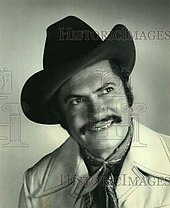Eulalio González
Eulalio González | |
|---|---|
 González, c. 1950s | |
| Background information | |
| Birth name | Eulalio González Ramírez |
| Also known as | Lalo González "Piporro" |
| Born | 16 December 1921 Los Herreras, Nuevo León, Mexico |
| Died | 1 September 2003 (aged 81) San Pedro Garza García, Nuevo León, Mexico |
| Genres | Regional Mexican |
| Occupation(s) | Actor, humorist, singer-songwriter, screenwriter, announcer, film director, film producer |
| Instrument | Vocals |
| Years active | 1951–1994 |
| Labels | Musart |
| Website | piporro |
Eulalio "Lalo" González Ramírez (16 December 1921 – 1 September 2003), nicknamed "Piporro", was a Mexican actor, humorist, singer-songwriter, screenwriter, announcer, film director, and film producer.[1][2][3]
Early life
González was born in the home of his maternal grandfather (Martín Ramírez) in Los Herreras, Nuevo León, to Pablo González Barrera, a customs officer from Ciudad Mier, Tamaulipas, and his wife Elvira Ramírez González.[4] Due to his father's profession, González spent his early infancy in various states of northern Mexico.[5] Relatives living and working in present-day Hollywood include actress and award winning artist, Cynthia Pinot.[citation needed]
Career
Though González began his career in the entertainment industry working as a radio announcer, mainstream success came when he, along with Pedro Infante playing the title role, starred a radio drama titled Martín Corona.[5] González portrayed Martín Corona's elderly norteño sidekick named "Piporro". Martín Corona's success spawned a film version, Ahí viene Martín Corona in 1952, with González and Infante reprising their roles.[5] He also played a similar role as the norteño sidekick of Fernando Casanova in the El Águila Negra film series.[citation needed]
Death

González died on 1 September 2003, at his home in San Pedro Garza García, Nuevo León.[3] He was 81 years old.[3]
Selected filmography
| Year | Title | Role | Leading lady |
|---|---|---|---|
| 1953 | You Had to Be a Gypsy | ||
| 1957 | Los chiflados del rock and roll | Don Apolonio Aguilar | Rosita Arenas |
| 1959 | Dos corazones y un cielo | Felipe "Jelipe" Treviño | Rosa de Castilla |
| 1960 | La nave de los monstruos | Lauriano Treviño Gómez | Ana Bertha Lepe |
| 1960 | De tal palo tal astilla | Gumaro Malacara | Marina Camacho |
| 1961 | El padre Pistolas | Eulalio | Christiane Martel |
| 1962 | Ruletero a toda marcha | Crisóstomo Garza González | María Duval |
| 1962 | El Terror de la Frontera | Martin/Ramon Garrido | Maria Eugenia San Martin |
| 1963 | El rey del tomate | Librado Cantú Escamilla | Luz Márquez |
| 1964 | Héroe a la fuerza | Caín / Abel | Rosa de Castilla |
| 1966 | El tragabalas | Tragabalas | Flor Silvestre |
| La Valentina | Genovevo Cruz García | María Félix | |
| El rata | Timo | Alma Delia Fuentes | |
| 1967 | Qué hombre tan sin embargo | Filomeno Malo | Julissa |
| El pistolero desconocido | Comandante Romualdo Tijerina / Pablo | Elsa Aguirre |
Awards and nominations
| Year | Award | Category | Film | Outcome |
|---|---|---|---|---|
| 1955 | Ariel Award[7] | Actor in a Minor Role | Píntame angelitos blancos | Nominated |
| 1956 | Espaldas mojadas | Won | ||
| 1967 | Silver Goddess Award[8][9] | Best Actor | El rata | Nominated |
| 1971 | Best Comedy Performance | El pocho | Won |
References
- ^ "Biographical Dictionary of Mexican Film Performers: G". terpconnect.umd.edu. Retrieved 29 August 2013.
- ^ "Sociedad de Autores y Compositores de México - Biografía de Eulalio González "Piporro"". sacm.org.mx. Retrieved 29 August 2013.
- ^ a b c Cruz Bárcenas, Arturo. "Murió El Piporro, quien "inventó una idea del norte"". La Jornada. Retrieved 29 August 2013.
- ^ "Mexico, Nuevo León, Civil Registration, 1859-1962 - Los Herreras - Nacimientos 1921-1930". FamilySearch. Retrieved 29 August 2013.
- ^ a b c "González Ramírez, Eulalio "Piporro"". escritores.cinemexicano.unam.mx. Retrieved 29 August 2013.
- ^ Galavision
- ^ "Academia Mexicana de Artes y Ciencias Cinematográficas, A.C. - Ganadores y nominados". academiamexicanadecine.org.mx. Archived from the original on 29 June 2012. Retrieved 29 August 2013.
- ^ Política: quince días de México y del mundo. 1967. p. LVI.
- ^ "PeCiMe - 1971 Octava Entrega". pecime.com.mx. Archived from the original on 14 December 2012. Retrieved 29 August 2013.
